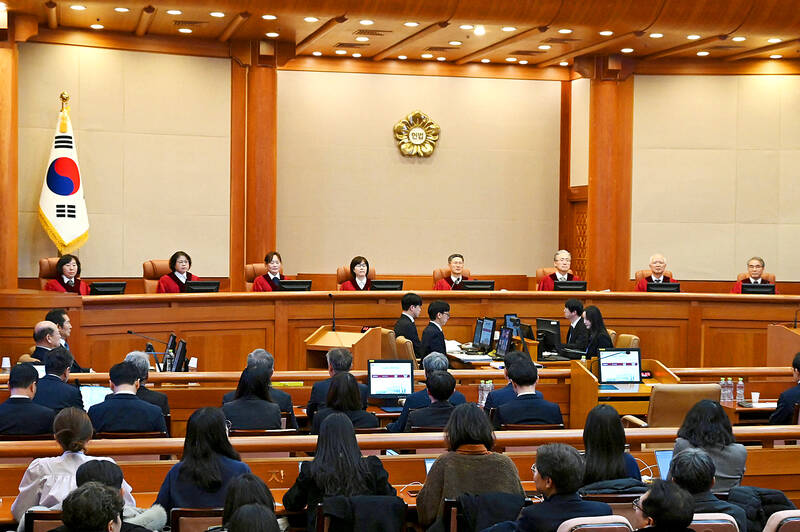Ousted South Korean President Yoon Suk-yeol’s bid to impose martial law was aimed at thwarting a “legislative dictatorship” by the opposition-controlled parliament, his lawyer said yesterday as Yoon became the country’s first president to stand trial in a criminal case while in office.
Yoon has been behind bars since he was arrested last month on charges of insurrection.
Criminal proceedings at Seoul’s Central District Court yesterday morning lasted just over an hour. Yoon attended the hearing, but did not speak.

Photo: AFP
Prosecutors have accused the suspended president of being the “ringleader of an insurrection.”
They argued against releasing him from the detention facility, saying Yoon could try to “influence or persuade those involved in the case.”
Addressing the court, Yoon’s lawyer Kim Hong-il in turn condemned the “illegal probe,” arguing that the “investigating body has no jurisdiction.”
“The declaration of martial law was not intended to paralyze the state,” Kim said.
Instead, it was meant to “alert the public to the national crisis caused by the legislative dictatorship of the dominant opposition party, which had crippled the administration,” he said.
“The judiciary must serve as the stabilizing force,” he told the court’s three judges, warning that he was “witnessing a reality where illegality compounds illegality.”
Separately, South Korea’s Constitutional Court is deliberating whether to formally remove Yoon from office following his impeachment by parliament in December last year.
Called to testify at that hearing was Han Duck-soo, who was also impeached as acting president following Yoon’s removal from office.
Han told the court that he had opposed Yoon’s declaration of martial law.
Han said that he and most of his fellow Cabinet members “believed it would put South Korea in serious difficulty,” and that he recalled them “being concerned and trying to dissuade it.”

Seventy percent of middle and elementary schools now conduct English classes entirely in English, the Ministry of Education said, as it encourages schools nationwide to adopt this practice Minister of Education (MOE) Cheng Ying-yao (鄭英耀) is scheduled to present a report on the government’s bilingual education policy to the Legislative Yuan’s Education and Culture Committee today. The report would outline strategies aimed at expanding access to education, reducing regional disparities and improving talent cultivation. Implementation of bilingual education policies has varied across local governments, occasionally drawing public criticism. For example, some schools have required teachers of non-English subjects to pass English proficiency

‘FORM OF PROTEST’: The German Institute Taipei said it was ‘shocked’ to see Nazi symbolism used in connection with political aims as it condemned the incident Sung Chien-liang (宋建樑), who led efforts to recall Democratic Progressive Party (DPP) Legislator Lee Kun-cheng (李坤城), was released on bail of NT$80,000 yesterday amid an outcry over a Nazi armband he wore to questioning the night before. Sung arrived at the New Taipei City District Prosecutors’ Office for questioning in a recall petition forgery case on Tuesday night wearing a red armband bearing a swastika, carrying a copy of Adolf Hitler’s Mein Kampf and giving a Nazi salute. Sung left the building at 1:15am without the armband and apparently covering the book with a coat. This is a serious international scandal and Chinese

PERSONAL DATA: The implicated KMT members allegedly compiled their petitions by copying names from party lists without the consent of the people concerned Judicial authorities searched six locations yesterday and questioned six people, including one elderly Chinese Nationalist Party (KMT) member and five KMT Youth League associates, about alleged signature forgery and fraud relating to their recall efforts against two Democratic Progressive Party (DPP) legislators. After launching a probe into alleged signature forgery and related fraud in the KMT’s recall effort, prosecutors received a number of complaints, including about one petition that had 1,748 signatures of voters whose family members said they had already passed away, and also voters who said they did not approve the use of their name, Taipei Deputy Chief Prosecutor

TRADE: The premier pledged safeguards on ‘Made in Taiwan’ labeling, anti-dumping measures and stricter export controls to strengthen its position in trade talks Products labeled “made in Taiwan” must be genuinely made in Taiwan, Premier Cho Jung-tai (卓榮泰) said yesterday, vowing to enforce strict safeguards against “origin laundering” and initiate anti-dumping investigations to prevent China dumping its products in Taiwan. Cho made the remarks in a discussion session with representatives from industries in Kaohsiung. In response to the US government’s recent announcement of “reciprocal” tariffs on its trading partners, President William Lai (賴清德) and Cho last week began a series of consultations with industry leaders nationwide to gather feedback and address concerns. Taiwanese and US officials held a videoconference on Friday evening to discuss the